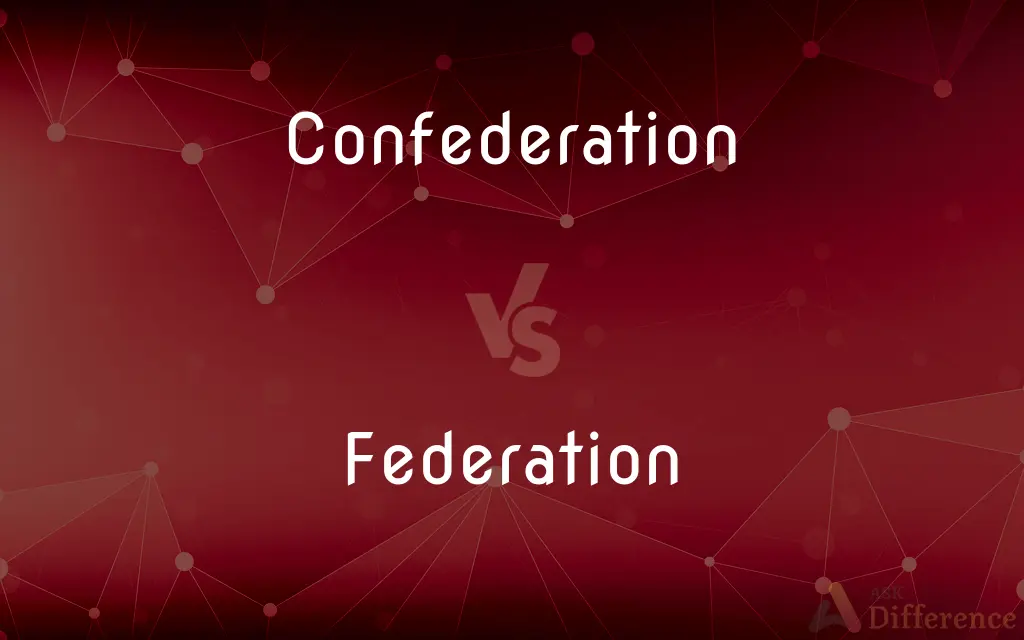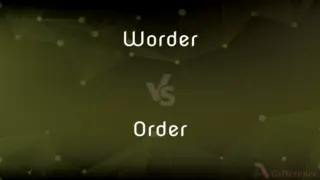Confederation vs. Federation — What's the Difference?
By Tayyaba Rehman — Updated on October 5, 2023
A confederation is a group of independent states united for certain purposes, while a federation is a union of states with a central government that holds primary sovereignty.

Difference Between Confederation and Federation
Table of Contents
ADVERTISEMENT
Key Differences
A confederation typically comprises sovereign states that retain most of their independence but unite for certain purposes, such as defense. A federation, on the other hand, is characterized by a central authority that holds significant powers, often with states or provinces that have limited sovereignty.
The essence of a confederation lies in its voluntary association where the central authority derives its powers from the member states. Conversely, in a federation, the central government often has powers directly vested in it, and its states or provinces operate under its authority.
While both confederation and federation involve multiple states or entities coming together, the binding nature differs. Confederations are generally more loose associations, often formed for mutual benefits or alliances. Federations are more integrated, with a constitution binding its members.
Confederations might dissolve or change their terms based on consensus or the changing needs of member states. In contrast, federations tend to have a more permanent nature, and changes to the federal structure usually require significant legal and constitutional amendments.
The distribution of power between the central authority and member states is a crucial distinction. In a confederation, the central body might only have powers granted explicitly by the member states. In a federation, the central government holds primary sovereignty, and any powers the states have are typically defined and limited by a constitution.
ADVERTISEMENT
Comparison Chart
Nature of Union
Loose association of sovereign states.
Integrated union with a central governing authority.
Sovereignty
Member states retain most of their sovereignty.
Central government holds primary sovereignty.
Distribution of Power
Central authority has powers granted by member states.
Central government has defined powers in a constitution. States/provinces operate under its authority.
Stability and Permanence
Can be more temporary, based on consensus or mutual benefits.
Typically more permanent with defined legal structures.
Legal and Constitutional Foundation
Might lack a robust constitution; relies on treaties or agreements.
Usually founded on a comprehensive constitution.
Compare with Definitions
Confederation
A group formed for mutual purposes.
The confederation aimed to promote trade among member nations.
Federation
An organization with groups that have common interests.
The federation of teachers advocated for better salaries.
Confederation
A temporary alliance of political units.
The city-states formed a confederation against the invading army.
Federation
A union formed on constitutional grounds.
The formation of the federation required each state's agreement.
Confederation
An association of sovereign states.
Switzerland was historically a confederation before becoming a federation.
Federation
A union of states under a central government.
The United States is an example of a federation.
Confederation
An organization that consists of a number of parties or groups.
The confederation of tribes came together for an annual meeting.
Federation
A system of government in which states share power with a national government.
The federation system helps balance local and national interests.
Confederation
A union with limited central authority.
The confederation allowed states to retain individual legislative powers.
Federation
A federation (also known as a federal state) is a political entity characterized by a union of partially self-governing provinces, states, or other regions under a central federal government (federalism). In a federation, the self-governing status of the component states, as well as the division of power between them and the central government, is typically constitutionally entrenched and may not be altered by a unilateral decision of either party, the states or the federal political body.
Confederation
A confederation (also known as a confederacy or league) is a union of sovereign groups or states united for purposes of common action. Usually created by a treaty, confederations of states tend to be established for dealing with critical issues, such as defense, foreign relations, internal trade or currency, with the central government being required to provide support for all its members.
Federation
The act of federating, especially a joining together of states into a league or federal union.
Confederation
The act of forming into or becoming part of a confederacy.
Federation
A league or association formed by federating, especially a government or political body established through federal union.
Confederation
The state of being confederated.
Federation
Act of joining together into a single political entity.
Confederation
A group of confederates, especially of states or nations, united for a common purpose; a league.
Federation
Array of nations or states that are unified under one central authority which is elected by its members.
Confederation
The union of the British North American colonies of New Brunswick, Nova Scotia, and the Province of Canada, brought about July 1, 1867, under the name Dominion of Canada.
Federation
Any society or organisation formed from separate groups or bodies.
Confederation
Federal union of all the Canadian provinces and territories.
Federation
A collection of network or telecommunication providers that offer interoperability.
Confederation
A union or alliance of states or political organizations.
Federation
(Australia) Of an architectural style popular around the time of federation.
We live in a federation house.
Confederation
The act of forming an alliance.
Federation
The act of uniting in a league; confederation.
Confederation
The act of confederating; a league; a compact for mutual support; alliance, particularly of princes, nations, or states.
The three princes enter into some strict league and confederation among themselves.
This was no less than a political confederation of the colonies of New England.
Federation
A league; a confederacy; a federal or confederated government.
Confederation
The parties that are confederated, considered as a unit; a confederacy.
Federation
An organization formed by merging several groups or parties
Confederation
The state of being allied or confederated
Federation
A union of political organizations
Confederation
A union of political organizations
Federation
The act of constituting a political unity out of a number of separate states or colonies or provinces so that each member retains the management of its internal affairs
Confederation
The act of forming an alliance or confederation
Federation
A structure where the central authority holds significant power.
In a federation, states often have powers outlined by the central constitution.
Common Curiosities
Can a confederation become a federation?
Yes, as historical examples like Switzerland show, a confederation can evolve into a federation.
Which is more permanent, a confederation or federation?
Federations are generally more permanent, with defined legal structures.
Is a confederation the same as a federation?
No, a confederation is a looser association of states, while a federation is an integrated union with a central government.
Is the European Union a federation or confederation?
The European Union has characteristics of both but is closer to a confederation as member states retain significant sovereignty.
How is power distributed in a federation?
In a federation, power is distributed between a central authority and member states, often defined by a constitution.
Do confederations have a central government?
Confederations may have a central body or authority, but it often has limited powers granted by member states.
Why might nations form a confederation?
Nations might form a confederation for mutual benefits, defense, or alliances without ceding significant sovereignty.
Can a federation dissolve into individual states?
While theoretically possible, it's complex due to the integrated legal structures of federations.
What binds states in a confederation?
States in a confederation are typically bound by treaties or mutual agreements.
How does the stability of a federation compare to a confederation?
Federations usually offer more stability due to their legal and constitutional foundation.
Which system retains more state sovereignty, confederation or federation?
Confederation allows member states to retain more of their sovereignty.
What’s a key feature of a federation's central government?
A federation's central government holds primary sovereignty, often outlined in a constitution.
Are member states in a federation sovereign?
States in a federation have limited sovereignty defined by the federation's constitution.
Which has a more robust constitution, a federation or confederation?
Federations typically have a more comprehensive constitution, while confederations might rely more on treaties.
Share Your Discovery

Previous Comparison
Direct vs. Indirect
Next Comparison
Worder vs. OrderAuthor Spotlight
Written by
Tayyaba RehmanTayyaba Rehman is a distinguished writer, currently serving as a primary contributor to askdifference.com. As a researcher in semantics and etymology, Tayyaba's passion for the complexity of languages and their distinctions has found a perfect home on the platform. Tayyaba delves into the intricacies of language, distinguishing between commonly confused words and phrases, thereby providing clarity for readers worldwide.















































